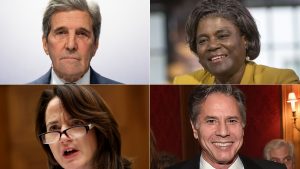Our Face to the World

Now begins the rebuilding of American leadership in the world. The right words are being said and the Biden foreign policy team is skilled and experienced. No one, however, should underestimate the difficulty of their task. Their success abroad depends on our success at home.
As my manuscript for Advocating Overlord neared completion in 2017, Donald Trump was newly in the White House. He got there with a xenophobic nationalist’s strategy of fact-ignoring demagoguery, targeting – in many forms – “the other” at home and abroad. Deeply concerned, I chose then to write in Advocating Overlord’s “Prologue” this warning for the future. I told readers that the book:
“… carries a caution to be drawn from the obstacles to be overcome by national leaders who in 1942-43 found cooperation between their countries retarded by stereotyping and suspicion. Distrust and prejudicial oversimplification had filled the void when collaborative international endeavor had dissipated in the shortness of two decades between the Armistice of 1918 and the outbreak of World War II. The resulting friction that held up agreement on a war winning strategy is a sharp reminder to us today. The corrosiveness of ill-formed stereotypes cannot be turned off and collaboration turned back on, like throwing a switch, even in the face of a shared existential threat.”
Then, distaining proven mechanisms for collective security, economic, and environmental cooperation, Donald Trump blew past the lessons from authoritarian assault on community and the rule of law that cost the world so much in the 20th century. He shook the norms of civil society at home and emboldened foreign autocrats. Hegemonic and law-perverting, Russia and China now sneer that democracy cannot meet 21st century needs anywhere. Sobering is this echo of mid-20th century, when fascism and Communism sought to challenge democracy.
Facing the new damage, we again are bound to the world and each other by shared existential threats – environmental, political, socio-economic, and moral – far more complex than what faced bickering Allies in 1943. However, we are bound also by our shared hope.
The key to success in the Allied strategy negotiation of mid-World War II was recognition and shared acceptance of the fact, as stated then, that “our problem is that we are not trusting each other.” Purposeful acts in response soon fostered a unity of effort that, while not frictionless, achieved victory and opened the door to a better world.
Before we can prevail over 21st century threats, we first must rebuild a foundation of trust. We start divided at home and with a popular majority abroad viewing the American political system as broken. Allies and friends everywhere want to trust the United States. But they are deeply shaken by the now-gone, autocratic U.S. president who incited insurrection against the constitution he had sworn an oath to defend. Rhetoric alone cannot repair that.
Our place in the world and practice at home are inseparable. We must establish trust among both ourselves and others abroad that, despite our flaws, the tenets of democracy that have been our own lodestar and a beacon to the world are more than what the United States espouses. They must demonstrably infuse and live in our deeds.
Philip Padgett examines history by applying skills developed during 40 years of national security and preparedness research and analysis in the military, government, and the private sector. As Deputy Intelligence Adviser at the U.S. Arms Control and Disarmament Agency, he supported from Washington teams negotiating five international treaties and agreements. Read more >>